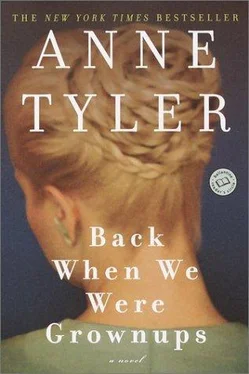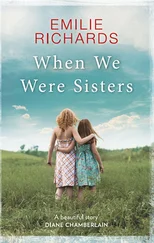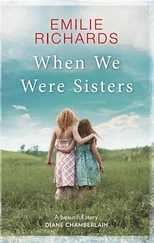She would go in for a conference and nod and look concerned, and then try not to show her pleasure when the teacher finished up by saying, “Apart from that, of course, your son is a real joy. None of my other students is as bright or creative as Tristram.”
“Yes, well, he’s always been very…” she would murmur. With her eyes modestly lowered.
In high school his sole companion would be a boy obsessed with computers. The two would spend whole weekends shut up in Tristram’s room, constructing something incomprehensible out of electrical wire and a disemboweled television set. She would knock and offer cookies; Tristram would say, “Huh? Oh. Thanks.” Then she would stand in his doorway a while breathing in the smells of machine oil and sweaty sneakers. It wouldn’t bother her a bit that he paid her no attention. She knew he had reached the stage where he had to start pulling away from her.
She knew that underneath, he would always love her.
“Hand me them corn ears, will you?” Alice Farmer said. “Miz Davitch? Pot’s on the boil. Could you please hand me the corn?”
Rebecca merely blinked at her.
* * *
There were so many people at dinner that the children had to eat separately. This caused several different arguments, because some of the children — the ones in their teens — felt they were old enough to eat with the grownups. And it didn’t help a bit that Tina kept saying, “Of course you’re old enough! Come sit next to me.” Rebecca had to step in, finally. “Tina,” she said, “this table seats twelve, and that’s how many adults we have. I’m putting all seven of the children in the kitchen.”
Tina shrugged and gave the teenagers a pouchy-lipped look of commiseration. Then she patted the chair to her right and said, “Oh, well, Barry, you sit next to me, then. And Hakim on my other side.” (The two best-looking men in the room, wouldn’t you know.) “Seven grandchildren!” she told Rebecca. “You and I could practically start a baseball team!”
Half of Rebecca felt flattered; there was a certain confiding, intimate quality to Tina that she always found seductive. But the other half wanted to point out that Tina had no right at all to claim Min Foo’s two children. She gave her a bland smile and then deliberately seated herself between her own favorites, Troy and Zeb, although her usual spot was next to Poppy. Poppy was down near the end, repeatedly asking if someone would please turn off the lights in the parlor. Nobody volunteered, though. They were all vying for Tina’s attention, the girls addressing her as “Mother” more often than was needed, forming their lips around the word in a self-conscious and unskilled manner.
It was pathetic to recollect that once, when Rebecca was first married, she had suggested to the girls that they call her “Mom.” “But you’re not our mom,” they had said. “That would be a lie.” Oh, children were such sticklers for the absolute, literal truth. (The other day, introducing Peter to the plumber, Rebecca had said, “Meet my future stepdaughter’s stepson; I mean my stepdaughter’s future stepson. My stepgrandson-to-be, I mean.” Mr. Burdick’s eyes had widened. No doubt he’d thought her unwelcoming, not to simply call the boy her grandson. But Rebecca knew from experience that Peter might all too well have contradicted her outright and made her look like a fraud.)
Alice Farmer sailed in, stately and important, holding a platter of crab cakes high above her head. “Why, Alice,” Tina said. “Are you still with us.” This gave Rebecca a twist of wicked satisfaction, because Alice Farmer hated being addressed by anything but her whole name. It was one of her quirks. Alice Farmer set the platter in front of Rebecca and sent Tina a long, flat stare beneath half-shuttered lids before she left the room.
“If I were Tina, I’d hire myself a taster before the next course,” Zeb murmured out of the side of his mouth. But Tina had blithely moved on, by now, to the subject of the wedding. She was asking Barry how he and NoNo had met, where he had proposed, what kind of ceremony they planned. Her questions were delivered with that falling intonation that the English use—“Won’t it be dreadfully hot in the garden”—and at some stage during her years abroad she seemed to have lost the knack of pronouncing her r ’s. “God-den,” was what she said. Rebecca resolved to stop being so critical. “Could I offer you a crab cake,” she asked Troy, but unfortunately the question came out with that same downward note at the end. Troy gave a sputter of a laugh. Rebecca plopped a crab cake onto his plate, pointedly avoiding his eyes.
“We’ve finally found a minister,” Barry was telling Tina. “NoNo and I were in a restaurant the other night, talking about who we could get to marry us, and our waitress said, ‘Why, I could do that.’ Turns out she has some kind of certificate she sent away for through the mail. Perfectly legal, she says. A really nice lady. Says she’ll do it for free.”
This was news to Rebecca. All she’d heard was that the officiator would be a woman. She had pictured someone magisterial, wearing a flowing black robe like Sandra What’s-It on the Supreme Court bench. Now a whole new image popped up: a person in a dingy pink nylon uniform and a hairnet.
“Well, and why not,” Tina said cheerfully. “It’s all a big charade, anyhow. Isn’t it,” she asked Hakim. He gave her a dazzled smile. “Just a primitive tribal ritual,” she went on, “meant to make us forget we’re merely propagating the species. When I think what I could have accomplished if I hadn’t bothered with marriage! It’s enough to make me weep.”
“What,” Zeb said politely.
“Pardon?”
“What could you have accomplished?”
“Well, you’ll have to ask my voice teacher that. She was devastated when I married Joe. Absolutely devastated. ‘My dear,’ she said, ‘you are throwing away a God-given talent, purely to enter an institution invented by males for their own benefit.’ And she was right; I know that now. Oh,” she said, turning a radiant smile on Hakim, “women may find marriage useful during that little childbearing phase. But then as the years go by, they need their husbands less and less while their husbands need them more and more. Men expect all that listening and marveling and yes-darling-aren’t-you-amazing, those balanced meals and clean sheets and waxed floors, and then the blood-pressure monitoring and the low-sodium diet, and the hand-holding when they retire and can’t think what to do with themselves. And the wives, meanwhile, start longing to get free. They start running off to their ladies’ luncheons and their women’s book-club meetings and their girls-only wilderness trips.”
“Great, Tina,” Zeb said. “You certainly know the right thing to say to a bridal couple.”
The others laughed — some a bit uncertainly, Rebecca thought. But Tina lifted her chin and told him, “I don’t notice you’ve been in any rush to marry.”
“No, I guess I haven’t,” he said. “I’m still waiting for Rebecca.”
Rebecca sent him a grateful smile, but Tina did not appear to have heard. “Seriously, though,” she told the others. “You have to admit that love is a waste. It’s expensive, it’s inconvenient, it’s time-consuming, it’s messy…”
They laughed again, more easily now. They must have decided she was joking. That Tina: such a card.
But Rebecca didn’t think she was joking. Or not entirely. She suspected Tina was expressing exactly what she felt.
The funny thing was that she felt that way herself, at certain moments. She gazed around her at this tangle of relatives and in-laws, the children tumbling in from the kitchen to complain about some injustice, Poppy announcing his birthday party for the thousandth time, Peter slouching wretchedly on the fringes of the group…
Читать дальше












